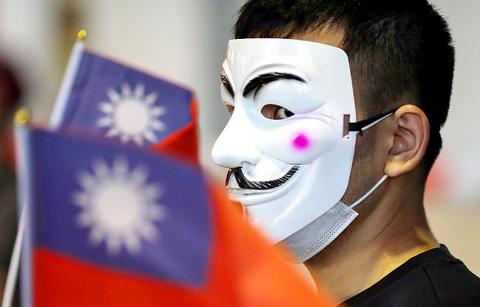Apple Inc yesterday removed an app criticized by China for allowing protesters in Hong Kong to track police, as Beijing steps up pressure on foreign companies deemed to be providing support to the pro-democracy movement.
Apple’s pulling of HKmap.live was criticized as bowing to China and comes as high-profile brands come under pressure over their perceived support for democracy demonstrations in the territory.
Chinese state media this week tore into the app, which collates information on police locations submitted by users, charging that it was helping “rioters.”

Photo: Reuters
The People’s Daily said that Apple was “mixing business with politics, and even illegal acts.”
“We have verified with the Hong Kong Cybersecurity and Technology Crime Bureau that the app has been used to target and ambush police,” said an Apple notification published on HKmap.live’s Telegram channel. “Criminals have used it to victimize residents in areas where they know there is no law enforcement.”
HKmap.live’s makers denied their app encouraged criminal activity and criticized Apple’s removal of it as “censorship” and “clearly a political decision to suppress freedom.”
Hong Kongers took to social media to protest the removal.
“Does Apple know it has the function to protect personal safety?” a user on forum LIHKG said. “The app actually tells people where not to go. It ensures residents’ safety.”

A magnitude 7.0 earthquake struck off Yilan at 11:05pm yesterday, the Central Weather Administration (CWA) said. The epicenter was located at sea, about 32.3km east of Yilan County Hall, at a depth of 72.8km, CWA data showed There were no immediate reports of damage. The intensity of the quake, which gauges the actual effect of a seismic event, measured 4 in Yilan County area on Taiwan’s seven-tier intensity scale, the data showed. It measured 4 in other parts of eastern, northern and central Taiwan as well as Tainan, and 3 in Kaohsiung and Pingtung County, and 2 in Lienchiang and Penghu counties and 1

A car bomb killed a senior Russian general in southern Moscow yesterday morning, the latest high-profile army figure to be blown up in a blast that came just hours after Russian and Ukrainian delegates held separate talks in Miami on a plan to end the war. Kyiv has not commented on the incident, but Russian investigators said they were probing whether the blast was “linked” to “Ukrainian special forces.” The attack was similar to other assassinations of generals and pro-war figures that have either been claimed, or are widely believed to have been orchestrated, by Ukraine. Russian Lieutenant General Fanil Sarvarov, 56, head

SAFETY FIRST: Double the number of police were deployed at the Taipei Marathon, while other cities released plans to bolster public event safety Authorities across Taiwan have stepped up security measures ahead of Christmas and New Year events, following a knife and smoke bomb attack in Taipei on Friday that left four people dead and 11 injured. In a bid to prevent potential copycat incidents, police deployments have been expanded for large gatherings, transport hubs, and other crowded public spaces, according to official statements from police and city authorities. Taipei Mayor Chiang Wan-an (蔣萬安) said the city has “comprehensively raised security readiness” in crowded areas, increased police deployments with armed officers, and intensified patrols during weekends and nighttime hours. For large-scale events, security checkpoints and explosives

‘POLITICAL GAME’: DPP lawmakers said the motion would not meet the legislative threshold needed, and accused the KMT and the TPP of trivializing the Constitution The Legislative Yuan yesterday approved a motion to initiate impeachment proceedings against President William Lai (賴清德), saying he had undermined Taiwan’s constitutional order and democracy. The motion was approved 61-50 by lawmakers from the main opposition Chinese Nationalist Party (KMT) and the smaller Taiwan People’s Party (TPP), who together hold a legislative majority. Under the motion, a roll call vote for impeachment would be held on May 19 next year, after various hearings are held and Lai is given the chance to defend himself. The move came after Lai on Monday last week did not promulgate an amendment passed by the legislature that